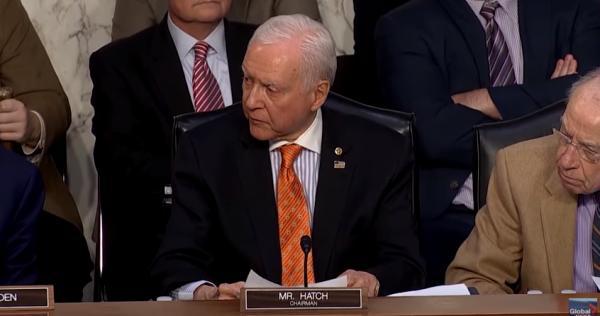
The announcement by Utah Sen. Orrin Hatch that he will not run for another term only adds to the drama of the 2018 mid-term elections. (Screen capture, YouTube, Global News)
It is not too early for conservatives, and particularly Second Amendment activists, to be thinking ahead to the November mid-term elections, especially since Fox News is reporting that there are 34 seats in U.S. Senate “up for grabs” and Utah Sen. Orrin Hatch, a Second Amendment stalwart, is retiring at the end of his term.
This is important for several reasons, primarily because the Senate confirms federal judges and Supreme Court justices. Rights activists alarmed at the way lower federal courts seem almost deaf and blind to the 2008 Heller and 2010 McDonald rulings that affirmed the Second Amendment protects an individual right to keep and bear arms not dependent upon service in a militia.
Lower courts are where much of the gun law is settled, and for gun owners, some of the circuits have not been friendly.
State legislative races are also on the ballot in November, along with every seat in the U.S. House of Representatives. The Fresno Bee recently editorialized about the concealed carry reciprocity bill currently in the Senate:
“All 14 House Republicans from California voted for this nutty bill, rebuking the notion that states have the right to govern their own affairs, so long as they follow the Constitution. We hope the bill dies in the Senate, although it remains a priority of the National Rifle Association, which spent $50 million-plus on campaigns in 2016 and will spend again in 2018.
“In 2018, voters will have their say. All 435 congressional seats are up for grabs, including 39 held by Democrats and 14 by Republicans in California. How members of Congress voted on the reciprocity bill ought to factor into those decisions.”
This, gun rights activists will say, is “what it is all about.”
There was another report in the Sacramento Bee about concealed carry in California. It referred to a report from the state Auditor’s Office that indicated counties in the Golden State handle the issuance of concealed carry permits differently. California has a discretionary issue process where law enforcement can turn down concealed carry applications, unlike a majority of states, which have “shall issue” statutes.
“Sacramento County,” the newspaper noted, “had 9,130 active concealed carry licenses and a county population of about 1.5 million, the audit said. San Diego, with a population of 3.3 million, had only 1,281 licenses. A manual count in Los Angeles County, population 10.2 million, found 197 active licenses.”
Contrast that with Washington State. As Liberty Park Press reported Tuesday, there are some 590,000 active concealed pistol licenses in the Evergreen State, where the law has been “shall issue” for decades. King County is the most populous county in the state, and as of Jan. 2, there were 100,152 active CPLs just in that county. Roughly 20 percent are held by women.
California, the most populous state in the West, had 1,930 homicides including 1,368 involving firearms in 2016, according the most recent FBI Uniform Crime Report.
Washington, the second most populous state in the West, logged 195 homicides that year, including 127 committed with firearms, the FBI data shows. Some lawmakers headed to Olympia next week for the legislative session would like to see Washington gun laws be more like California’s.
Rights activists planning to participate in a Second Amendment rally on the capitol steps in Olympia on Jan. 12 will most likely have November on their minds. They know it is not too early to be thinking ahead.